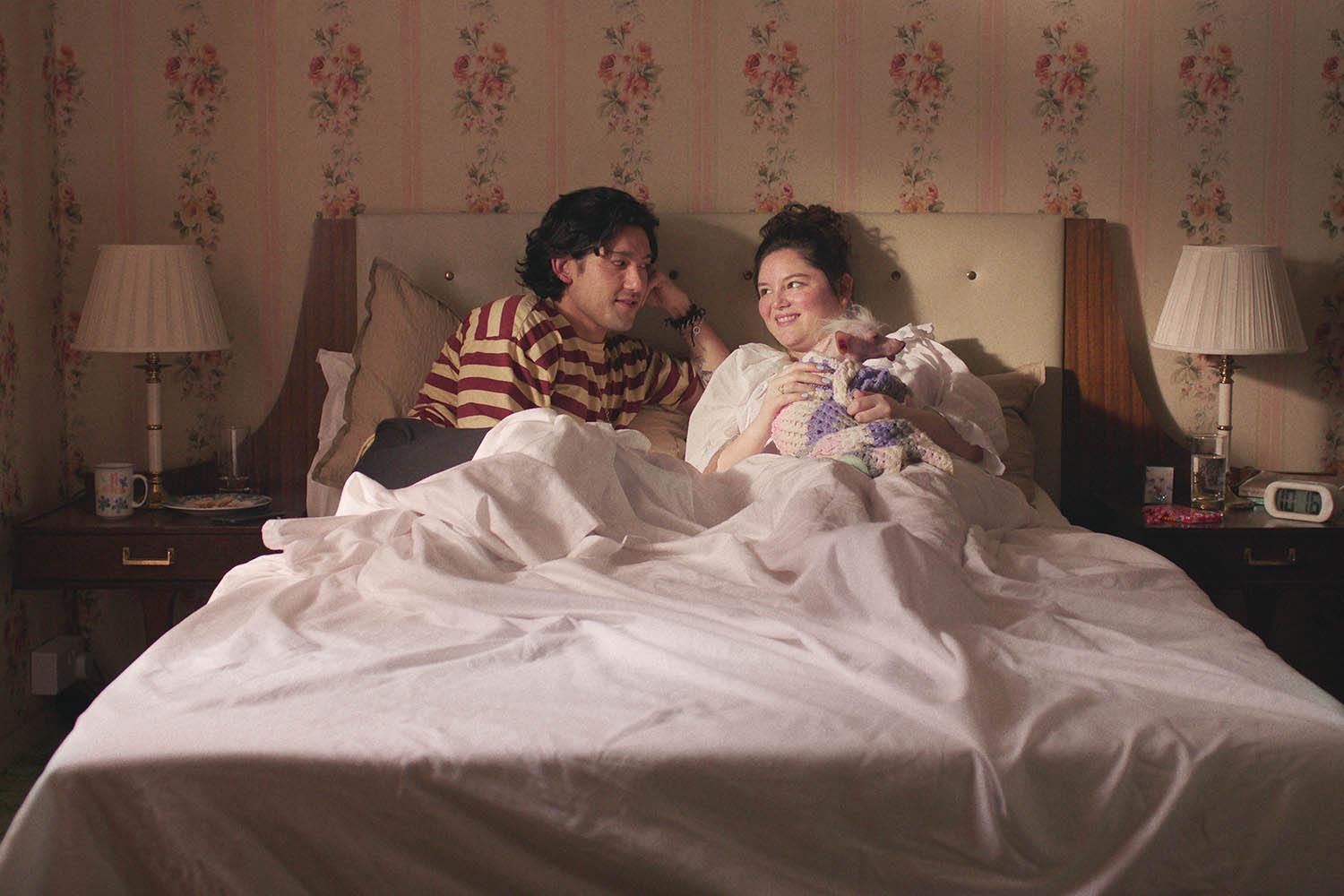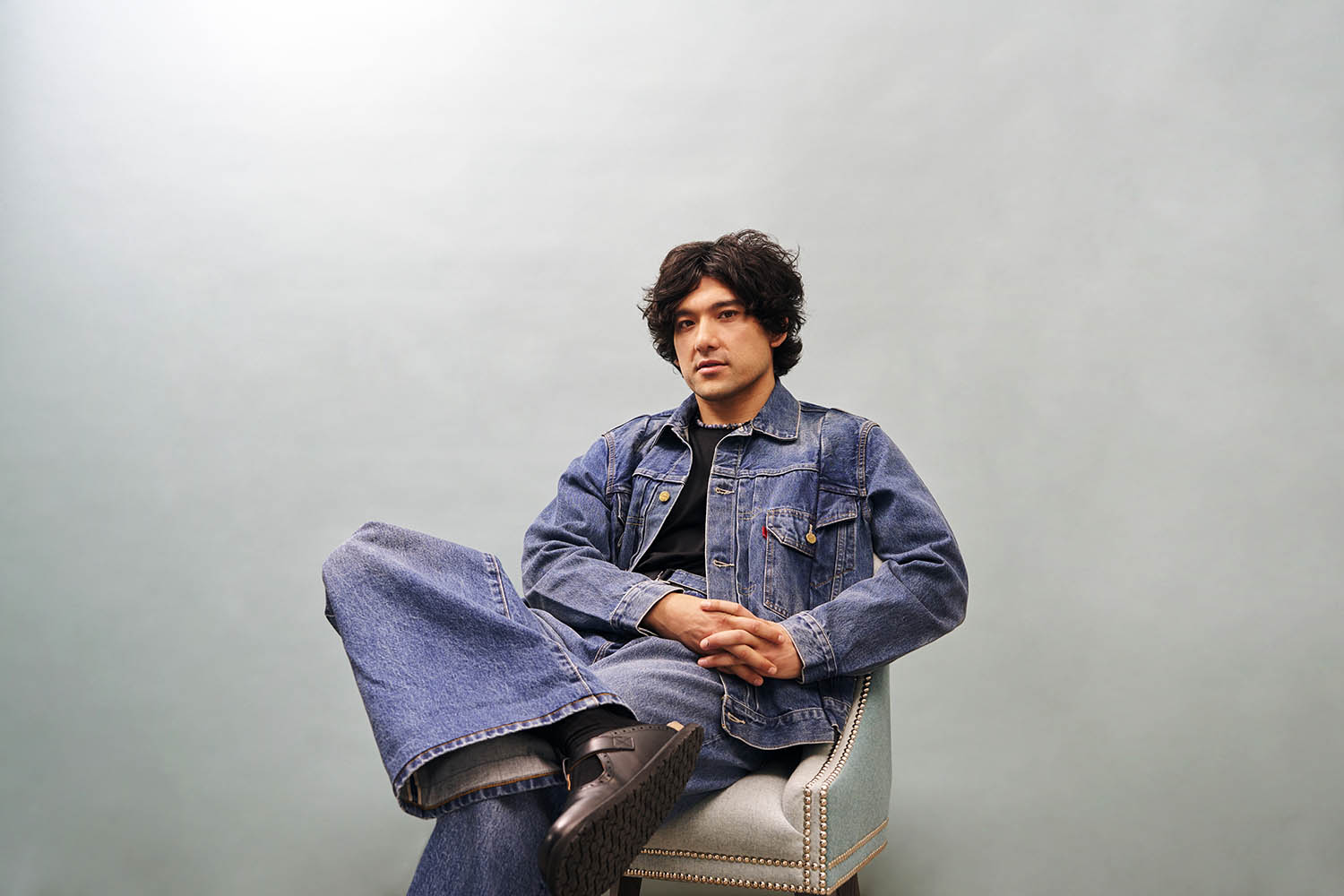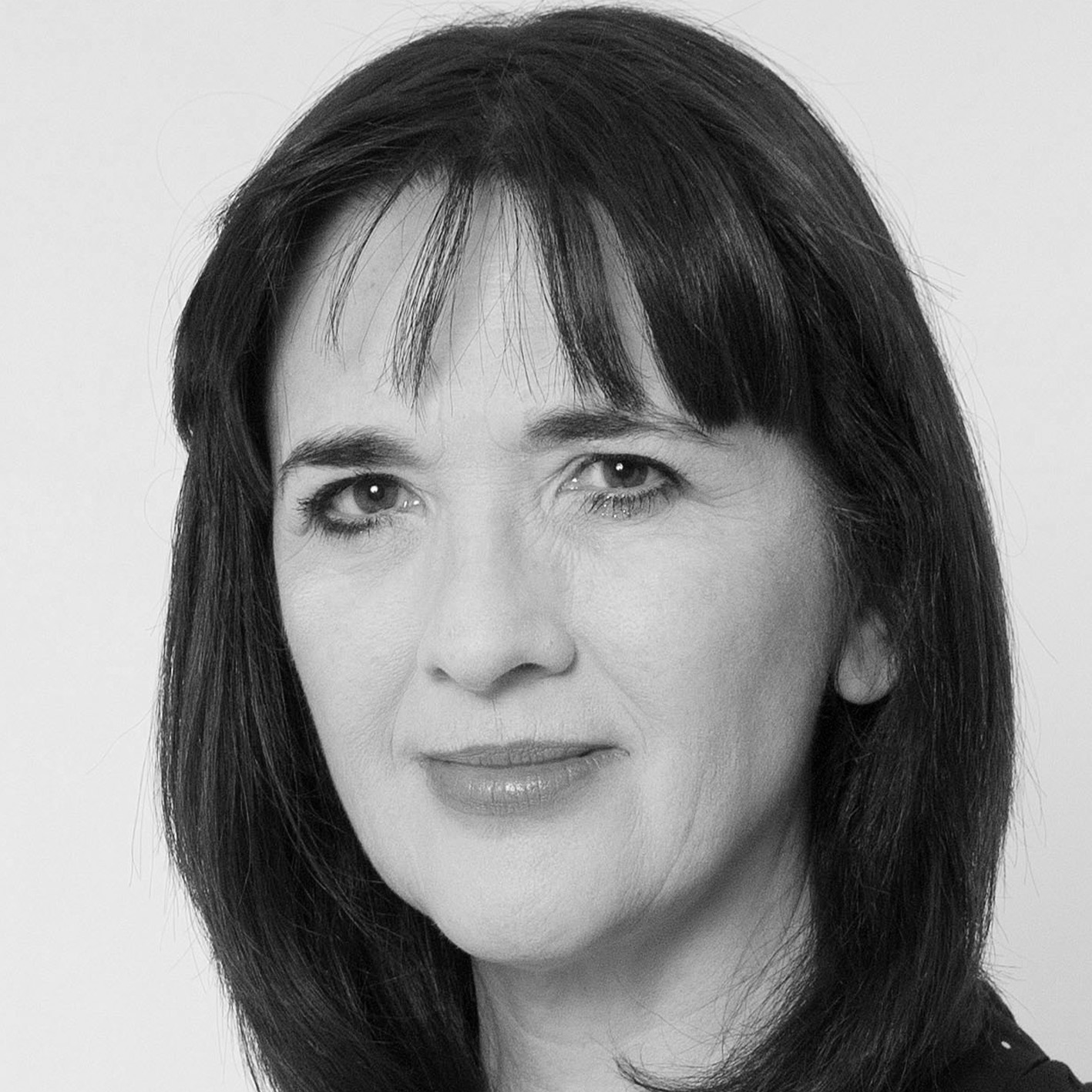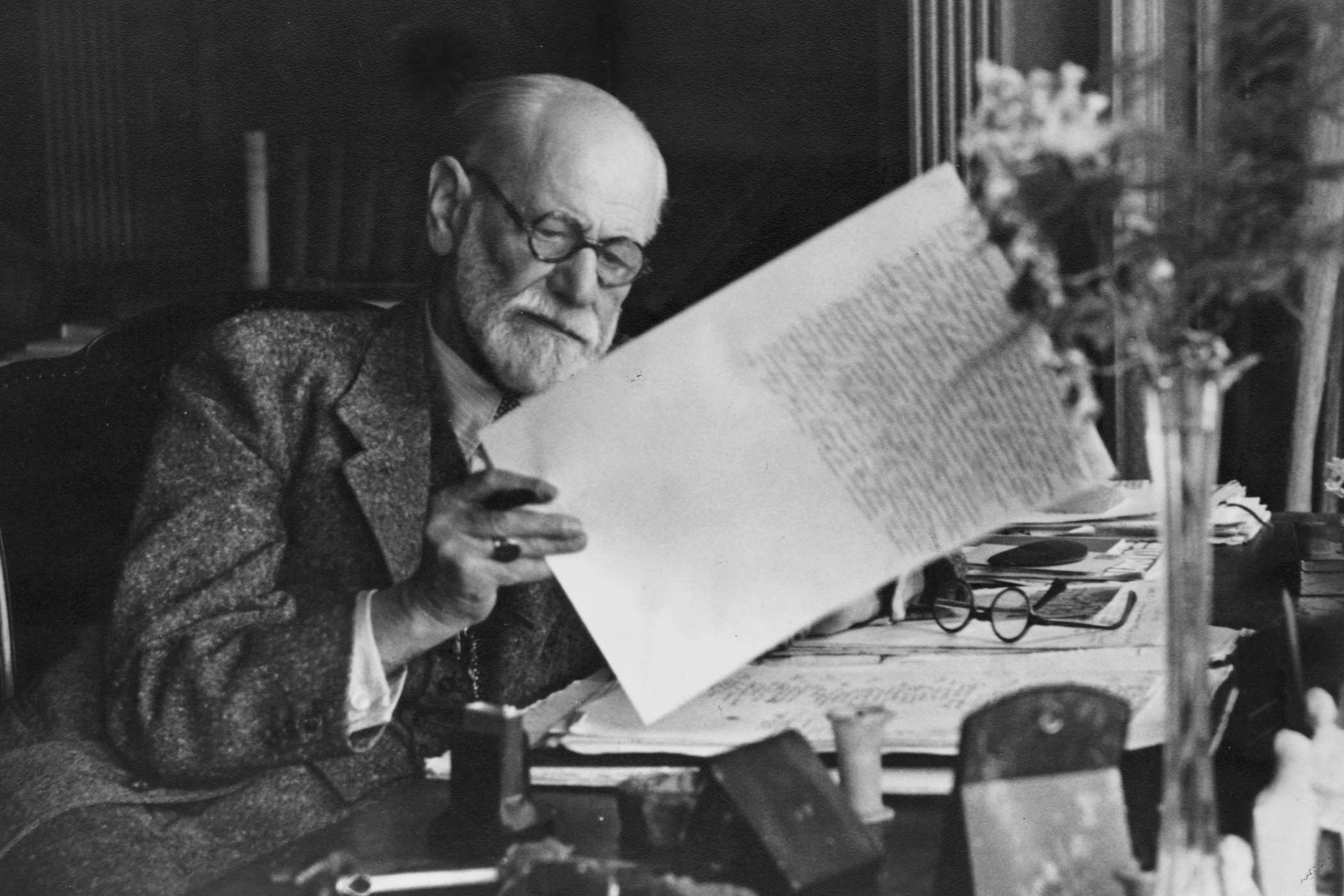Portrait by Suki Dhanda
Will Sharpe is sitting, quietly, unassumingly, in front of me on a sofa in a London hotel. We’re talking about his latest role, his first as romantic lead, in Lena Dunham’s Netflix series Too Much. An indie romcom – think a hipster Bridget Jones, set in a grubbier London with riskier tone shifts – it’s based on Dunham’s experience of moving to London from New York, and meeting the musician Luis Felber, whom she married in 2021.
Sharpe plays Felix, an emotionally unspooling musician daubed in eyeliner and nail varnish, and the love interest of Jessica, played by Megan Stalter. Felber co-created Too Much, and Jessica and Felix could be viewed as his and Dunham’s proxies, but only loosely. Sharpe never felt he was meant to be Felber. “The germ of it is inspired by Lena coming to London and meeting Luis, but it is a work of fiction,” he tells me.
Sharpe was a fan of Dunham’s Girls, her groundbreaking New York TV comedy that jimmied open the Pandora’s box of life, love and chaos for women in the 2010s – and her films, from her debut indie feature, Tiny Furniture, to her 13th-century coming-of-age story Catherine Called Birdy. He found Dunham “collaborative, open, curious”. “She’s the real deal … it felt, straight away, like easy creative chemistry.”
To bring Felix’s band to life, Sharpe worked with Felber, who wrote their songs. Sharpe was in bands as a teenager – one with his composer brother, Arthur – and wanted to perform the songs himself. “I can play well enough to noodle at home. My nightmare would be to have a shot of someone’s head, they’re going like this [he waggles his head] and it cuts to someone else’s hands, and it just feels completely bananas.”
In person, Sharpe is laidback, solicitous (peering into my coffee cup: “Is that enough milk?”), but reflective and sincere. Dressed in bulky clothes, ink-black hair hanging shaggily over a boyish face, he does not have an iota of starriness about him. He is baffled when I ask about being a Hollywood sex symbol (which ramped up when his character took his shirt off in The White Lotus): “I’m not on any social media or anything. Perhaps I’m not really aware of it.” For all his friendliness, you sense a deep-rooted shyness. “I do often feel socially anxious. I’m probably quite good at hiding it.” He gives a shrugging smile. “Everyone feels a bit socially anxious, don’t they?”

‘I often feel socially anxious’: Will Sharpe with Megan Stalter in Too Much
Like Dunham, Sharpe is a so-called multi-hyphenate: writer-director-actor. His 2011 writing-directing debut film, Black Pond, was Bafta-nominated, while his dark comedy series Flowers was hailed as “perfect” by Paul Thomas Anderson. Benedict Cumberbatch personally requested Sharpe as the writer-director for his 2021 biopic, The Electrical Life of Louis Wain. Olivia Colman, who starred in Flowers, brought him on as director and co-writer of Landscapers, a disquieting take on true crime created by her husband, Ed Sinclair.
As an actor, Sharpe’s roles have included an acerbic drug-addicted rent boy in Giri/Haji (he won a Bafta for best supporting actor) and a well-meaning, geeky tour guide on a Holocaust heritage trip in Jesse Eisenberg’s trauma comedy A Real Pain. In The White Lotus, his tense portrayal of pent-up tech-bro Ethan earned him an Emmy nomination.
“Whether you’re watching him in Giri/Haji or White Lotus or Flowers, everything he does, he completely transforms,” Dunham told the Hollywood Reporter. In Too Much, he shapeshifts again. Felix should be wrong as a romantic lead, but in Sharpe’s hands he becomes right: a messy, anti-Mr Darcy. When I say that Felix initially manifests as a red flag, Sharpe laughs: “I like that he’s a little bit cool but also a bit of a dork and his defences are up.” Kohl-smudged Felix is in touch with his feminine side. “One time, Lena said: ‘You look like a lesbian, but that’s a high compliment.’ I took it as one.”
To look back at Sharpe’s TV debut, Flowers – a blackly comic portrait of a dysfunctional, psychologically paralysed family – is to be reminded of how radical it was. Sharpe called it “a comedy with a mental illness”.
Newsletters
Choose the newsletters you want to receive
View more
For information about how The Observer protects your data, read our Privacy Policy
“I didn’t realise how much that show would be about that,” he says. “I became aware that there were things I needed to say that I hadn’t worked out.” Sharpe is diagnosed with type-two bipolar: “You get something called hypomania, which is not full-blown psychosis. The other side of it is depressive episodes. It was frightening and quite confusing. I didn’t know why the world felt a certain way, or why I could feel so radically different.”
The diagnosis demystified his condition. “Creative excitement is an unusual state. I try to separate them in my mind.” Does he take medication? “Yeah, but everybody’s different and I’m on the mild end of the spectrum. It’s part of my life but it’s something that – touch wood – I’m getting better at managing. Things that once upon a time I might have not noticed or might even have leaned into – certain states – I now have learned to moderate.”
Sharpe is British-Japanese: born in the UK, he grew up in Tokyo, returning at the age of eight and going on to attend Winchester college. He remembers the confusion he felt when he first returned to the UK, be it over trivial matters of sport (he mimes holding a cricket bat up like a baseball bat) or more serious cultural alienation, as he tried to navigate labyrinthine British social codes. After school, he read classics at Cambridge, where he became president of the influential sketch troupe, Footlights.
Lena said: ‘You look like a lesbian, but that’s a high compliment.’ I took it as one
Lena said: ‘You look like a lesbian, but that’s a high compliment.’ I took it as one
“I do find that a lot of the time when I’m writing, that experience, moving here, finds its way into the script somehow,” he says. Starting from his time at international school, writing helped him find his voice. “Even if I didn’t understand exactly how to communicate in groups, if there was a creative writing assignment, I felt: I know I can do that. It was a way of making myself feel I belonged.”
In Too Much, we learn Felix’s race earned him a jarring school nickname. Did Sharpe experience racism himself? “You’re definitely aware of what you look like. And I’ve had experiences that have made me feel a certain way, of course. That includes in the industry too: often I’d be reading for the guy at the computer on the spaceship... Inevitably, if you are mixed race, or different in some way, that will be a part of what you carry through the world. It’s a thing that you don’t think about all the time every day.”
Sharpe is married to the actor Sophia di Martino, who starred in Flowers. The two met filming Casualty and have two children. Has fatherhood changed him? “Of course!” he beams. “It changes your life almost immediately. It’s paradoxically tough and tiring but also extremely rewarding and brings new kinds of poetry into your life. That’s where my life is: at home.”
Sharpe will appear in the TV version of Peter Shaffer’s Amadeus, reuniting him with Giri/Haji writer Joe Barton and director Julian Farino. He is also set to write, direct and act in a series he created, Prodigies, starring The Bear’s Ayo Edebiri. “It’s about two child prodigies who became boyfriend and girlfriend, and now they’re in their early thirties. It’s a romantic story about long-term relationships but also this idea of potential and whether you’re supposed to fulfil it. I’m definitely excited to be back on the other side of the camera.”
Sharpe has clearly lived up to his own potential, though there have been low points along the way. “I’ve pitched many things that haven’t got made. I’ve failed a lot.” But what he really loves is collaboration. “The thrill of it for me is the work. At its best, it feels like a bunch of friends trying to figure out: how are we going to make this?”
Too Much will be on Netflix from 10 July
Photographs by Suki Dhanda, Netflix



